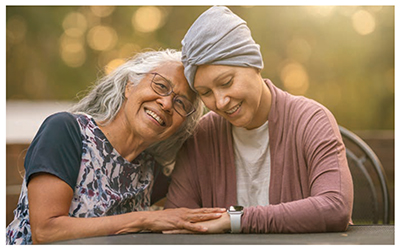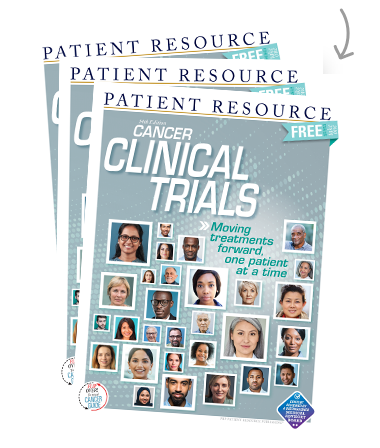Clinical Trials
For the Caregiver
Your role as a caregiver may not be new. You may be accustomed to helping your loved one with many important tasks, from attending medical appointments and managing medications to preparing meals and communicating with the health care team, family and friends. But, if a treatment clinical trial is the next step for your loved one, you should know that some of your responsibilities will take on increased importance.
The reason your responsibilities will be different is because the goal of the trial is to measure the effectiveness of the experimental treatment. Very specific protocols are put in place, and every participant in the clinical trial must follow them to ensure the scientific data is most helpful. You will be an integral part in ensuring your loved one adheres to the protocols and reporting the required data.
At first these new responsibilities may seem overwhelming, but they are also exciting. Along with participating in a trial that hopefully helps your loved one feel better or even be cured, you both are making a valuable contribution to the future of cancer care.
Every clinical trial is different, but here are key things to know and ways you may help.

Listen and learn together. Facing cancer is scary, and the unknowns associated with a clinical trial may add questions. Use the resources in this guide and those from your loved one’s medical team and clinical trial team to learn more about the clinical trial process. Once your loved one selects a trial, read the Informed Consent form thoroughly. It provides details about the specific trial, including the goal of the trial, the number of appointments, the therapy being used and more. The more you know, the more comfortable you both will be moving forward.
Get the OK to receive medical information. One of the first things to do is make sure you are authorized to communicate with the clinical trial team, access medical information, renew prescriptions and more. You are likely set up to do this with your loved one’s health care team, but it is wise to check with the clinical trial team in case any additional forms are required. If you are unsure about the forms you may need to sign, ask a member of the clinical trial team.
Transport to and from appointments. Often, trials require more appointments than a typical treatment plan. It is necessary that your loved one goes to every scheduled appointment, from screening through the end of the trial. Make sure your schedule at work or at other commitments will allow for you to take your loved one to and from each appointment.
Ask if telehealth appointments are available. Using computers, phones, video conferencing and the internet, telehealth allows you to communicate with your clinical trial team without having to travel to the clinical trial location. The stress and effort involved with getting to and from frequent appointments could be alleviated if some of those appointments could be done by this convenient option.
Collecting data. The timely and detailed reporting of symptoms, side effects and other key indicators is crucial. To ensure you understand the information to track and why you are tracking it, plan to attend all appointments with your loved one. Information to collect may involve medication schedules, adverse reactions and data captured from monitoring devices. The trial depends on the quality and quantity of the data collected.
Ask about remote monitoring options. Sometimes data can be collected electronically using a phone, tablet or other device. This option could offer a convenient alternative to traveling to an in-person appointment.
Write down your questions. You may have questions that are not part of the "required" information that you are asked to report. At the beginning of the clinical trial, ask the trial team whom to contact with your questions and when it is appropriate to reach out. It may be the principal investigator or another member of the study team. Also ask about the preferred contact method, such as mail, health care portal, telephone call or messaging.
Plan for respite care. These new tasks must be performed regularly for as long as the trial lasts. That can add a great deal to your duties, especially if you work, have children, care for other relatives or have other responsibilities. For your mental and physical well-being, you should plan for others to help you with certain things.
Before you shrug off this advice, keep this in mind: You could become worn down or find it difficult to keep up with the requirements of the clinical trial. As a result, your loved one may not get the intended treatment, and the trial itself will suffer because the protocols will not be followed. In extreme cases, your loved one may be asked to leave the trial. Ask the clinical trial team if they offer any participant support services, such as transportation.
Take care of yourself. You will be a more effective caregiver if you feel emotionally and physically healthy. Keep up with your medical appointments, social relationships, hobbies and exercise plan. Share your feelings with friends, a therapist or spiritual leader. Consider connecting with other caregivers of people in clinical trials.



